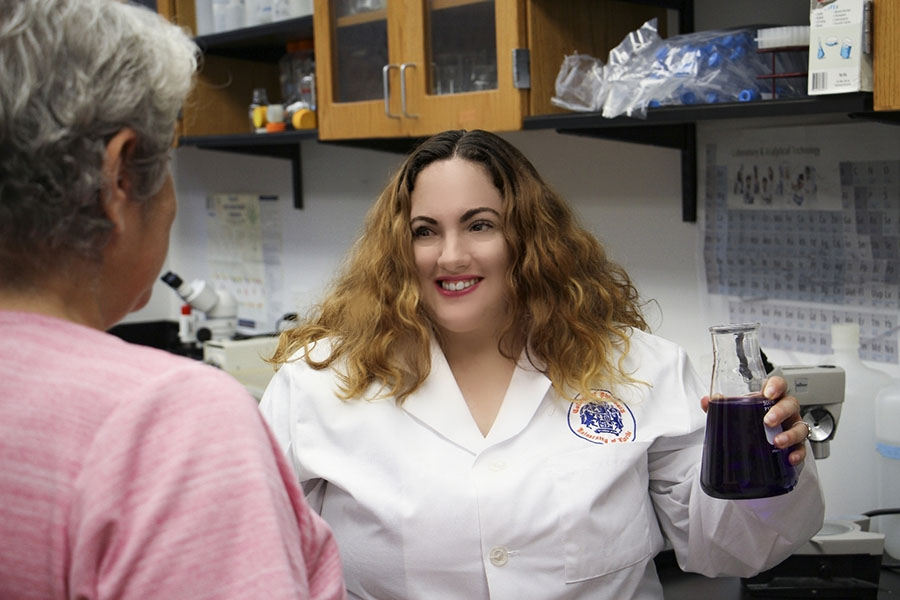
Dr. Jenny Wilkerson is working to define new therapies for people with chronic pain and therapeutic options for people struggling with addiction. She also teaches first-year pharmacy students at the University of Florida. (Photo by Donovan Baltich/University of Florida College of Pharmacy)
Oct. 1, 2019
By focusing her research on discovering drugs for new and innovative treatments for chronic pain and drug addiction Dr. Jenny Scott Wilkerson ’04 also is applying the knowledge she developed at Northwest and incorporating her perspectives as scientist of Native American descent.
“It’s leveraging the background in general biology that I’ve had in botany, chemistry and the immune system from Northwest Missouri State into cutting-edge therapeutic treatments for chronic pain and drug addiction. Northwest laid a foundation of science knowledge to prepare me for my next steps in my career.
”
Wilkerson is a research assistant professor in the Department of Pharmacodynamics at the University of Florida’s College of Pharmacy. Recently, the National Institute on Drug Abuse awarded Wilkerson and her colleagues two grants totaling about $7 million to study kratom, which comes from the leaves of a tropical tree from Southeast Asia and could be remedy for drug addiction and chronic pain.
“A lot of this has come through natural product research,” Wilkerson said. “It’s leveraging the background in general biology that I’ve had in botany, chemistry and the immune system from Northwest Missouri State into cutting-edge therapeutic treatments for chronic pain and drug addiction. Northwest laid a foundation of science knowledge to prepare me for my next steps in my career.”
A descendant of the Muscogee Creek tribe, which was forced to move from the southeast to Oklahoma during the Trail of Tears, Wilkerson’s father moved to Belton, Missouri, when he was young. There, Wilkerson’s family remained deeply connected to their heritage and regularly took her to Haskell Indian Nations University in nearby Lawrence, Kansas, for activities to immerse her in their roots.
After earning her Bachelor of Science degree in cellular and molecular biology, with a minor in chemistry, from Northwest, Wilkerson headed to the University of New Mexico for its minority-centered focus on developing scientists. She felt a deep connection with the Native American community there while earning a Ph.D. in biomedical sciences. Her dissertation advisor, Dr. Erin Milligan, also was of a minority descent and instilled in Wilkerson a need to learn more about people living with chronic pain.
“Working with Dr. Milligan made me realize how marginalized of a community chronic pain patients are,” Wilkerson said. “Coming from a minority background, that really resonated in me because these patients are a vulnerable population, and they get treated as such by the medical community.”
While at University of New Mexico, Wilkerson was involved in the Society of Advancing Chicanos and Native Americans in Science, or SACNAS, a leading community of Native American and minority scientists in the United States that focuses on nurturing scientists from underprivileged minority backgrounds to help diversify the field. Last year, SACNAS selected her for its Linton-Poodry Leadership Institute, allowing her to engage in a week-long intensive training session at the Academy of Advancement of American Science in Washington, D.C.
In 2013, Wilkerson moved to Virginia Commonwealth University in Richmond, Virginia, to work as a post-doctoral fellow in its Department of Pharmacology and Toxicology. She worked with Dr. Aron Lichtman, one of the world’s leading scientists on cannabinoid systems, and received the prestigious Ruth L. Kirschstein F32 Individual National Research Service Award.
When she arrived at VCU, Wilkerson had begun exploring the cannabinoid type 2 receptor, which – unlike the receptor that causes highs from certain drugs – is predominant in immune cells and can be activated without causing a high. Her research was timely because the nation’s opioid crisis had started to become mainstream news.
“It really made me realize that this picture is a lot bigger than just chronic pain,” she said. “There’s a population of people in chronic pain who use opioids as prescribed, but then they become addicted. They’re different patient populations, but they’re all vulnerable patient populations, and the stigma’s there.”
As Wilkerson furthers her research at the University of Florida, she is applying the plant biology and other knowledge she gained at Northwest.
“Native American people are very much in tune to natural products, to trying to keep things as close to natural as possible, so it’s very interesting that my career trajectory has gone to that level of mostly being interested in natural products,” she said. “My upbringing has led me full circle to my current career path.”